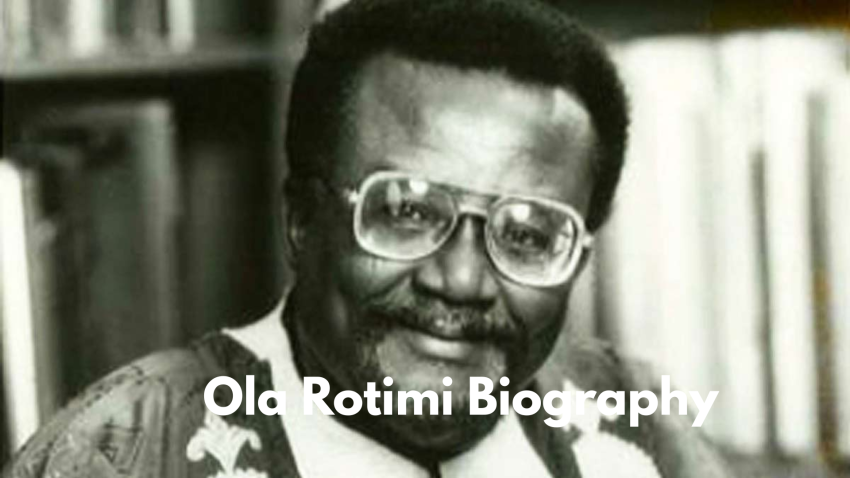Olawale Gladstone Emmanuel Rotimi, better known as Ola Rotimi (13 April 1938 – 18 August 2000), remains one of Nigeria’s most influential dramatists, directors and theatre educators.
He wrote, directed and taught plays that fused traditional African performance elements with modern theatrical techniques, producing enduring works such as The Gods Are Not to Blame and Ovonramwen Nogbaisi.
Profile Data
- Full Name: Olawale Gladstone Emmanuel Rotimi.
- Stage Name: Ola Rotimi.
- Born: 13 April 1938, Sapele, British Nigeria.
- Died: 18 August 2000 (aged 62), Ile-Ife, Nigeria.
- Nationality: Nigerian.
- Occupation: Playwright, theatre director, academic/teacher.
Early life and family
Ola Rotimi was born in Sapele to a culturally mixed family: his father, Samuel Gladstone Enitan Rotimi, was Yoruba and worked as a steam-launch engineer and amateur theatre director; his mother, Dorcas Adolae Oruene Addo, was Ijaw and is described in sources as an enthusiast of drama and performance. This bicultural background—Yoruba and Ijaw—became a recurring source of inspiration in his work and helped shape his lifelong interest in blending African traditions onstage.
Education and formative years
Rotimi’s early schooling took place in Port Harcourt and Lagos; he later travelled to the United States to study theatre. He earned a Bachelor of Fine Arts from Boston University and then an MA from the Yale School of Drama, where he was a Rockefeller Foundation scholar in playwriting and dramatic literature. These experiences gave him both technical theatre training and exposure to Western dramatic forms—tools he would later repurpose to craft plays rooted in African contexts.
Career highlights and major works
Ola Rotimi’s career combined playwriting, directing and teaching. He taught at institutions including Obafemi Awolowo University and served as head of the Department of Creative Arts at the University of Port Harcourt; he also worked as a visiting professor abroad. His plays are known for reworking history and myth into stage dramas that interrogate leadership, identity and cultural conflict.
Among his best-known works:
- The Gods Are Not to Blame (1968/1971) — a Yoruba-set adaptation of Sophocles’ Oedipus Rex that became canonical in African theatre and is widely taught and staged.
- Ovonramwen Nogbaisi — a historical drama focusing on the Oba of Benin and questions of leadership and colonial encounter.
- Our Husband Has Gone Mad Again, Kurunmi, If: A Tragedy of the Ruled, and many other plays and essays on theatre practice.
Style and themes
Rotimi’s theatrical style mixes adaptation of classical forms (e.g., adapting Greek tragedy to Yoruba contexts), cultural authenticity (drawing on Yoruba ritual, music and oral performance techniques) and political/social critique—especially about leadership, corruption, and identity in post-colonial Nigeria. His blending of vernacular idioms with modern drama created a powerful, accessible theatre for broad Nigerian and African audiences.
Personal life
In 1965 Rotimi married Hazel Mae Gaudreau, a French-Canadian who had been a student in the United States; she was active in the arts. The marriage produced four children. Hazel predeceased Rotimi by a short period in 2000.
Legacy and honours
Rotimi’s influence endures across Nigerian theatre: scholars, directors and playwrights continue to study and stage his plays. Institutions and societies—such as literary societies formed to celebrate his work—and the Rotimi Foundation preserve and promote his legacy.
Why Ola Rotimi matters today
Ola Rotimi helped demonstrate how African stories could be staged with both local authenticity and global dramatic craft. His reworkings of classic forms and his historical dramas gave Nigerian and African audiences theatrical works that were both entertaining and thought-provoking—useful models for playwrights and directors seeking to balance tradition and modernity.
FAQs
When was Ola Rotimi born and when did he die?
He was born on 13 April 1938 and died on 18 August 2000 (aged 62).
What is Ola Rotimi best known for?
He is best known as a playwright and director; his most famous play is The Gods Are Not to Blame.
Did Ola Rotimi teach theatre?
Yes. He taught at major Nigerian universities (including Obafemi Awolowo University and the University of Port Harcourt) and served as head of the Department of Creative Arts at Port Harcourt.
Who was Ola Rotimi’s spouse and did he have children?
He married Hazel Mae Gaudreau in 1965; they had four children. Hazel predeceased him in 2000.
Where can I read or watch his plays?
Many of Rotimi’s plays are published in print editions and academic anthologies. Staged productions and revivals are sometimes held by theatre companies and universities; check theatre archives and cultural foundations such as the Rotimi Foundation for resources.
Conclusion
Ola Rotimi’s work established him as a central figure in modern African theatre: a playwright who respected and reused local performance traditions while applying rigorous dramatic craft. His plays—especially The Gods Are Not to Blame—continue to be studied, staged and celebrated for their depth, theatricality and cultural resonance. For anyone exploring African drama, Rotimi’s blend of history, myth and political insight offers a powerful model for telling stories that belong to their people while speaking to universal human concerns.
